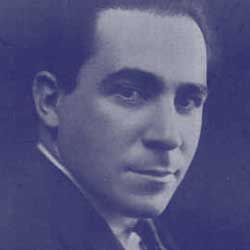Oscar Lorenzo Fernandez Biography - A Very Quick Guide
Artist:
Oscar Lorenzo Fernandez
Born:
4 November 1897, Rio de Janeiro
Died:
27 August 1948, Rio de Janeiro
Oscar Lorenzo Fernández was a Brazilian composer, conductor, and educator, remembered as one of the most important figures in shaping a distinctly Brazilian voice in classical music during the first half of the 20th century.
Early Life and Education
Fernández was born on November 4, 1897, in Rio de Janeiro, into a middle-class family. Initially, he studied medicine, but his passion for music soon prevailed. He enrolled at the Instituto Nacional de Música (today the Escola de Música da Universidade Federal do Rio de Janeiro), where he studied harmony, counterpoint, and composition with notable Brazilian teachers such as Francisco Braga and Henrique Oswald.
Career as Composer
Fernández became known for his efforts to synthesize Brazilian folk and popular traditions with classical compositional techniques. His early works leaned toward European Romanticism, but he gradually developed a personal style that reflected the rhythmic vitality and melodic contours of Brazil’s cultural heritage.
Some of his most celebrated works include:
Batuque (1928) – a vibrant orchestral finale to his Suite Brasileira n.º 2, inspired by Afro-Brazilian drumming. It became his most famous piece internationally.
Reisado do Pastoreio (1930) – a ballet that further explored Afro-Brazilian themes.
Malazarte (1931–1933) – the first successful Brazilian opera on a genuinely national subject, drawing on folklore and featuring strong rhythmic and melodic Brazilian characteristics.
Symphonic poems, chamber music, piano works, and choral compositions, many of which reveal his balance between European forms and Brazilian idioms.
His music often integrated dance rhythms such as samba and batuque with refined orchestration, positioning him alongside Heitor Villa-Lobos as a pioneer of Brazilian modernism in music.
Educator and Institution Builder
Fernández was equally influential as a teacher. He founded the Conservatório Brasileiro de Música in 1936, an institution that became a leading force in Brazilian music education. Through his teaching, he nurtured an entire generation of composers, conductors, and performers, leaving a lasting legacy beyond his own works. Later Life and Death Despite his relatively short life, Fernández held prominent positions in Brazil’s musical institutions. He directed the Instituto Nacional de Música and was involved in cultural policymaking during the Vargas era, which promoted nationalism in the arts. Oscar Lorenzo Fernández died in Rio de Janeiro on August 27, 1948, at the age of 50. Legacy Though less internationally famous than Villa-Lobos, Fernández played a central role in establishing a national school of Brazilian classical music. His opera Malazarte and the orchestral showpiece Batuque remain milestones in Brazil’s musical history, celebrated for their fusion of popular roots with classical form. His influence as an educator through the Conservatório Brasileiro de Música continues to resonate in Brazilian musical culture.
Early Life and Education
Fernández was born on November 4, 1897, in Rio de Janeiro, into a middle-class family. Initially, he studied medicine, but his passion for music soon prevailed. He enrolled at the Instituto Nacional de Música (today the Escola de Música da Universidade Federal do Rio de Janeiro), where he studied harmony, counterpoint, and composition with notable Brazilian teachers such as Francisco Braga and Henrique Oswald.
Career as Composer
Fernández became known for his efforts to synthesize Brazilian folk and popular traditions with classical compositional techniques. His early works leaned toward European Romanticism, but he gradually developed a personal style that reflected the rhythmic vitality and melodic contours of Brazil’s cultural heritage.
Some of his most celebrated works include:
Batuque (1928) – a vibrant orchestral finale to his Suite Brasileira n.º 2, inspired by Afro-Brazilian drumming. It became his most famous piece internationally.
Reisado do Pastoreio (1930) – a ballet that further explored Afro-Brazilian themes.
Malazarte (1931–1933) – the first successful Brazilian opera on a genuinely national subject, drawing on folklore and featuring strong rhythmic and melodic Brazilian characteristics.
Symphonic poems, chamber music, piano works, and choral compositions, many of which reveal his balance between European forms and Brazilian idioms.
His music often integrated dance rhythms such as samba and batuque with refined orchestration, positioning him alongside Heitor Villa-Lobos as a pioneer of Brazilian modernism in music.
Educator and Institution Builder
Fernández was equally influential as a teacher. He founded the Conservatório Brasileiro de Música in 1936, an institution that became a leading force in Brazilian music education. Through his teaching, he nurtured an entire generation of composers, conductors, and performers, leaving a lasting legacy beyond his own works. Later Life and Death Despite his relatively short life, Fernández held prominent positions in Brazil’s musical institutions. He directed the Instituto Nacional de Música and was involved in cultural policymaking during the Vargas era, which promoted nationalism in the arts. Oscar Lorenzo Fernández died in Rio de Janeiro on August 27, 1948, at the age of 50. Legacy Though less internationally famous than Villa-Lobos, Fernández played a central role in establishing a national school of Brazilian classical music. His opera Malazarte and the orchestral showpiece Batuque remain milestones in Brazil’s musical history, celebrated for their fusion of popular roots with classical form. His influence as an educator through the Conservatório Brasileiro de Música continues to resonate in Brazilian musical culture.
Top Pieces on 8notes by Oscar Lorenzo Fernandez
